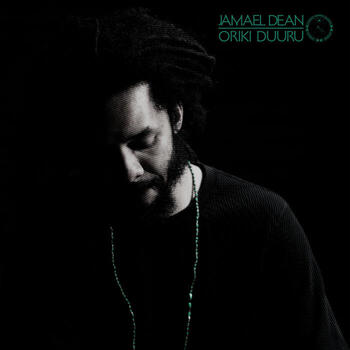Jamael Dean, "Oriki Duuru" (Stones Throw)
This grips you like a fist. After 2020's sequestered piano-solo meditations ("Ished Tree") and a few vocal-Afro-groove and electronic excursions ("Primordial Waters," "Oblivion," "Black Space Tapes"; also hip-hop "Ibowo" under the name Jasik) arrives Dean's live nonstop improvisation, throwing open every aspect of his distinctive skill on the grand, grand, grand piano.
MetalJazz first experienced 17-year-old Dean in 2015 as he offered a brief demonstration of why a Young Talent award was getting tossed at him. The keyboard already seemed like an extension of his mind -- he had an inventive harmonic sensibility; his touch was sure, his rhythm effortless.
With "Oriki Duuru," we dance with both the interior and exterior Dean in a passionate, ever-evolving performance. Thelonious Monk is much on his mind -- in the masculine percussion of his attack, in occasional dissonant clusters, and most obviously in interpreting Monk's "Light Blue" and remodeling Monk's version of "I Should Care." He also revisits the jazz repertory by applying Monkian single-note continuity to his roller-coaster "Tin Tin Deo" and by inventing a neatly orientalized and upended "Green Dolphin Street."
Dean hears the whole universe and moves around comfortably in it. The colliding stars, the emotional evaporations, the whiffs of whimsy, the romantic sparkle, the doubtful rumblings, the querulous darkness -- there's just as much Scriabin, Stravinsky and Horowitz here as jazz. Which you could also say of the late Horace Tapscott, though he and Dean (whose drummer grandfather played with Tapscott) are very different pianists.
One Dean composition ties together the 2020 and 2025 solo recitals: "Cancer," whose dense overlayerings of beauty and fury read like a faster-paced update of Billy Strayhorn's "Blood Count." It communicates complexities; here and many other places, Dean's abstractions lay bare the inadequacy of words. We are told that "Oriki Duuru" means "Piano Poems" in Yoruba. That's about right.
Listen/buy here.
Jamael Dean plays 2220 Arts & Archives (where this album was recorded last year) Sunday, May 25.
Pan Afrikan Peoples Arkestra, "Live at Widney High, December 26th, 1971" (The Village)
The latest archival release from the late Horace Tapscott's Pan Afrikan Peoples Arkestra finds the Ark in one of its earlier acts of community service, letting African-American youth know where they came from and where they might go together.
The 12- or 13-member ensemble spends the first 25 minutes settling in on John Coltrane's moody "Equinox," highlighted by an astringent, outward-bound tenor solo from Al Collins, who impresses throughout the concert in the absence of alto man "Black Arthur" Blythe, absent because, Tapscott mentions at the end, he missed the train from San Diego.
The show's spiritual center arrives with Tapscott's jump-riffing, horn-oozing arrangement of the ancient bluesy lament "Motherless Children," sung with soulful credibility and heavenly range by Linda Hill. Eric Dolphy pal Lester Robertson blasts a powerful trombone solo, seeming to falter until the other horns lift him up -- a nice touch. Poet Kamau Daáood is on fire, declaiming about "a cold cave, an asphalt grave" and bellowing "a long way from ommmmm" in tribute/refutation to Coltrane's album "Om."
No one ever played piano like Tapscott, except possibly his mother. Following his unpredictable fingers ranks as this recording's greatest attraction, the best examples arriving on Pharoah Sanders' "The Creator Has a Master Plan," where he lets his imagination wander into the Arabian desert, and on "Herbert Baker Medley," where he romps on the strange chord progression of "Life's a Chant" as Hill successfully negotiates the difficult intervallic vocal leaps.
Herbert Baker was a talented composer and pianist who died in a car wreck at 17, a hint at why Tapscott posthumously titled Baker's turbulent, surging instrumental "Flight 17." Tapscott also wanted the kid's music to keep flying, an aspect of the bandleader's desire to perpetuate African rhythms and group expressions, and to foster community. "Letting you know that it's real," he insists. If the applauding teens in attendance didn't know it then, they'd learn that Tapscott would indeed be there for them to the end of his life.
Listen/buy here.

